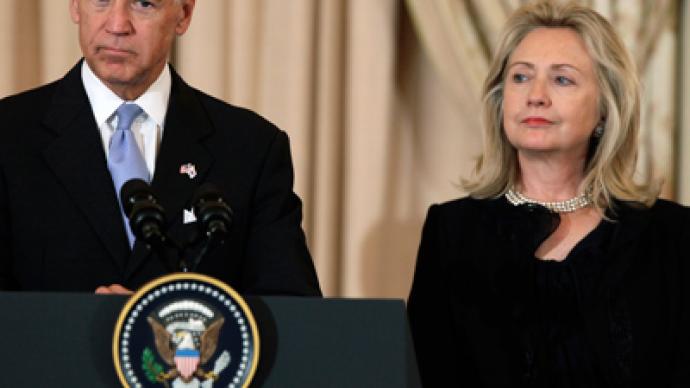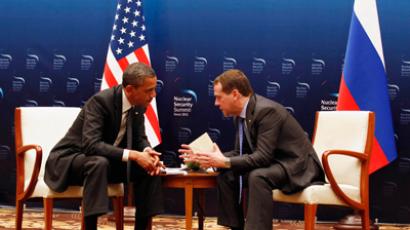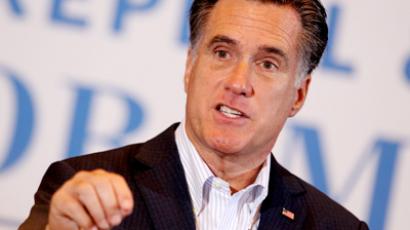Clinton, Biden call out Romney for ‘Cold War’ tone on Russia

US Vice President Joe Biden and Secretary of State Hillary Clinton, in separate comments, have criticized Republican presidential hopeful Mitt Romney over perceived tardiness in judging Russia in Cold War terms.
Romney’s statement last week labeling Russia as the US' "number one geopolitical foe,” and criticism of President Barack Obama’s promise of “more flexibility” on missile defense, has found little support with top presidential aides in Washington. Commenting on the remarks separately, Biden and Clinton both accused Romney of thinking in Cold War terms of the mid-20th century that have nothing to do with current US-Russia relations.“He acts like he thinks the Cold War is still on, Russia is still our major adversary. I don’t know where he has been,” Biden said about Romney in a Sunday interview on the CBS current affairs program “Face the Nation.”Admitting different stances on a number of issues, Biden however mentioned the US and Russia being "united" on some key points.“This is not 1956. We have disagreements with Russia, but they’re united with us on Iran. One of only two ways we’re getting material into Afghanistan to our troops is through Russia … if there is an oil shutdown in any way in the Gulf, they’ll consider increasing oil supplies to Europe.”And Clinton’s remarks on CNN were similar to those of the vice president.“I think it’s somewhat dated to be looking backwards instead of being realistic about where we agree, where we don’t agree,” she said in an interview during a visit to Turkey.The Romney campaign was quick to strike back to the criticism from the top officials.“Vice President Biden appears to have forgotten the Russian government’s opposition to crippling sanctions on Iran, its obstructionism on Syria and its own backsliding into authoritarianism. And Secretary Clinton herself asked recently of Russia, ‘whose side are they on?’,” a statement by Romney policy director Lanhee Chen reads. Chen has also called out the Obama administration for “concession after concession” to Russia.On Tuesday last week, the Republican presidential candidate said Russia is the “number one geopolitical foe” for the United States. In an interview with CNN, Romney said that Russia “lines up with the world’s worst actors” including Syria and Iran. He also blasted Obama’s talks with outgoing Russian President Dmitry Medvedev at the nuclear security summit in Seoul on Monday. “The actions he’s taken so far, which he says are to reset relations with Russia, have not worked out at all,” said Romney. Medvedev responded to the Republican frontrunner, saying his remarks had a “Hollywood” flavor and pressed the American hopeful to check his watch: “It’s 2012 now, not the mid-1970s.”“This is without question our number one geopolitical foe; they fight for every cause for the world’s worst actors. The idea that he has more flexibility in mind for Russia is very, very troubling indeed,” he said.The harsh comment referred to Obama’s words to Medvedev on Monday, caught on tape during the global nuclear security summit in South Korea.“This is my last election. After my election I have more flexibility,” Obama implored.Obama was in fact assuring the departing Russian president that he would have the “flexibility” required to deal with missile defense issues after the 2012 presidential election.In the past Russia has strongly opposed the fortifications being built in Europe to intercept ballistic missiles, expressing fears that the US will use the system against Russia. The US insists its intended purpose is strictly for defense against countries such as Iran.














